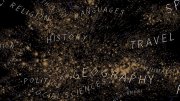According to ChatGPT, the most important person in the world is the marine biologist, writer, and conservationist Rachel Carson—or so it seems based on “Artificial Worldviews,” a research project released today by Kim Albrecht of Harvard’s metaLAB, a project of the Berkman Klein Center for Internet & Technology that works at the intersection of the humanities, technology, and design.
For the project, Albrecht asked the application programming interface (API) of the widely publicized artificial intelligence (AI) system, ChatGPT, about its knowledge of the world. (Albrecht used the latest free version of the technology, ChatGPT-3.5.) The first prompt asked ChatGPT to create a dataset of all the different categories of knowledge it possessed; ChatGPT provided 31 responses, such as geography, film, and sports. From there, a recursive algorithm requested data about subfields within each category—for geography, for instance, ChatGPT provided subfields such as cartography, mountains, and oceans. Finally, the algorithm requested the API to list the key humans, objects, and places within each category and subfield. Albrecht then mapped the results in a data visualization, in which fields connect to subfields and objects and humans connect by co-mentions in similar fields.
Albrecht said he became interested in mapping ChatGPT’s knowledge base because of what is commonly referred to as the “black box problem”—humans’ inability to understand how complex AI models make decisions. Although many researchers are concerned with examining the internal workings of ChatGPT to address this issue, Albrecht thought he could also understand ChatGPT’s worldview by looking at its outputs. “We don’t understand other humans by looking into the structures of their brains, but by talking to them,” he says. “We know other humans pretty well by observing how they interact, behave, think about things.” Researchers might understand ChatGPT in a similar way, he thought, by systematically prompting it about the scope of its knowledge. “When you request something from ChatGPT, after a while, you get some kind of intuition about how that system behaves, how it acts, what it’s capable and incapable of doing, how it’s structuring the world,” he says.
In total, Albrecht’s algorithm prompted ChatGPT 1,764 times. Among the people ChatGPT named in response to specific prompts, men appeared three times as often as women. But in other ways, the returned data were more diverse than he expected: Rachel Carson, named 73 times, was the most common response ChatGPT provided. She was followed by the primatologist Jane Goodall (named 60 times), the ancient Greek philosopher Aristotle (52 times), the Kenyan political activist Wangari Maathai (44 times), and the physicist Isaac Newton (41 times).
The responses don’t represent an unbiased look at ChatGPT’s knowledge base, Albrecht cautions. Several factors shaped the responses obtained, including how ChatGPT handles requests, how it understands the information it was trained on, and the political influences woven into its artificial neural network. The way that Albrecht structured his prompts could also have influenced the responses. “I thought it was strange that the most common responses were all humans,” he says. “But that could be because of the way I asked the question. I first requested humans, and in the second request, I asked for ideas, places, objects—so there are more things that it has to fulfill than just ‘humans.’”
He hopes that the results can help researchers and laypeople better understand ChatGPT—and how this AI system moderates and filters that knowledge before presenting it to users. ChatGPT’s knowledge base is made of hundreds of billions of tokens—units of text that were extracted from larger sequences. About 410 billion of these tokens come from a dataset provided by Common Crawl, which combs through the Internet and archives web pages such as Wikipedia.
“As anybody who has spent time on the Internet knows, not all sources reliable,” Albrecht says. In response, OpenAI, the parent company of ChatGPT, has put “a lot of human labor” into filtering these sources. Time reported in January that OpenAI paid workers in Kenya $2 per hour to sort through tens of thousands of lines of text and filter out sometimes graphic content related to topics such as murder, torture, and self-harm. Human labor also goes into attempts to eliminate biases in ChatGPT’s responses. This filtering likely shaped the outputs Albrecht received—perhaps making figures like Rachel Carson more popular than expected.
Albrecht hopes to continue working on the project. He’s creating another similar map, for which he prompted ChatGPT about the different categories of power instead of knowledge—he was inspired by Michel Foucault’s work about the connections between the two. (“The most powerful person, I can already tell you, is Gandhi,” Albrecht says. “Then, Nelson Mandela.”) He is also looking into the computation, data, labor, and other material qualities that are involved in ChatGPT’s decision-making processes. Eventually, he hopes to synthesize these projects, exploring how the material aspects of ChatGPT shape its understanding of knowledge and power—and making the black box of AI a little less inscrutable in the process.








